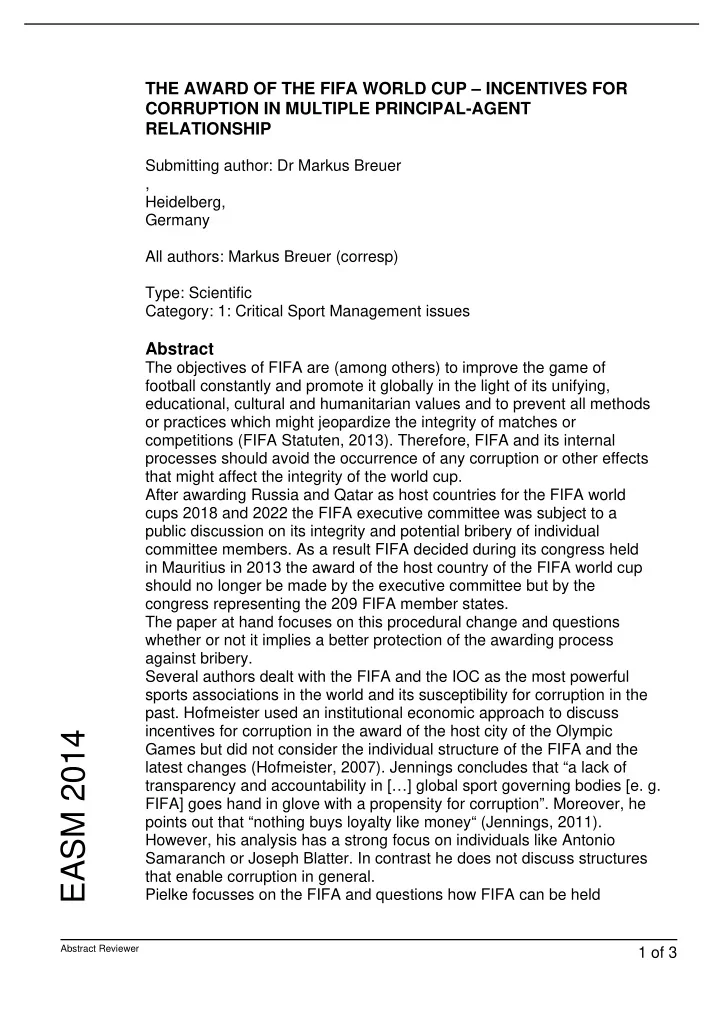

THE AWARD OF THE FIFA WORLD CUP – INCENTIVES FOR CORRUPTION IN MULTIPLE PRINCIPAL-AGENT RELATIONSHIP Submitting author: Dr Markus Breuer , Heidelberg, Germany All authors: Markus Breuer (corresp) Type: Scientific Category: 1: Critical Sport Management issues Abstract The objectives of FIFA are (among others) to improve the game of football constantly and promote it globally in the light of its unifying, educational, cultural and humanitarian values and to prevent all methods or practices which might jeopardize the integrity of matches or competitions (FIFA Statuten, 2013). Therefore, FIFA and its internal processes should avoid the occurrence of any corruption or other effects that might affect the integrity of the world cup. � After awarding Russia and Qatar as host countries for the FIFA world cups 2018 and 2022 the FIFA executive committee was subject to a public discussion on its integrity and potential bribery of individual committee members. As a result FIFA decided during its congress held in Mauritius in 2013 the award of the host country of the FIFA world cup should no longer be made by the executive committee but by the congress representing the 209 FIFA member states. � The paper at hand focuses on this procedural change and questions whether or not it implies a better protection of the awarding process against bribery. � Several authors dealt with the FIFA and the IOC as the most powerful sports associations in the world and its susceptibility for corruption in the past. Hofmeister used an institutional economic approach to discuss incentives for corruption in the award of the host city of the Olympic EASM 2014 Games but did not consider the individual structure of the FIFA and the latest changes (Hofmeister, 2007). Jennings concludes that “a lack of transparency and accountability in […] global sport governing bodies [e. g. FIFA] goes hand in glove with a propensity for corruption”. Moreover, he points out that “nothing buys loyalty like money“ (Jennings, 2011). However, his analysis has a strong focus on individuals like Antonio Samaranch or Joseph Blatter. In contrast he does not discuss structures that enable corruption in general. � Pielke focusses on the FIFA and questions how FIFA can be held Abstract Reviewer 1 of 3
accountable (Pielke, 2013). To answer this questions he distinguishes between seven different perspectives of accountability including hierarchical accountability, supervisory accountability and general discussion of accountability. The paper indicates that with only a few exceptions FIFA sits free from the formal mechanisms of accountability that are employed to hold international organizations to accountability to their own stated goals. However, he does not shed light on the specific question what changes due to the assignment of the FIFA world cup could be implemented to reduce incentives for corruption. � The paper at hand uses an institutional economic approach for analyzing principal-agent relationships between different levels of FIFA executives and FIFA members that is similar to the approach applied by Hofmeister. However, it investigates explicitly if the change of the award of the world cup (i. e. that the decision is made by the FIFA congress instead of the executive committee) is able to lower incentives for corruption. � On the basis of the structure of the FIFA and the principal-agent relationships we forecast electoral behaviour and compare these forecasts to actual outcomes. Principal-agent relationships include e. g. the relationships between (i) players and national football federations, (ii) national federations and the FIFA and (iii) different institutions at the level of the FIFA. We assume individual utility and profit maximizing individuals who are subject to restrictions regarding their action (e. g. regulations) and public observation. In case of the award of the host country, FIFA congress members and/or executive committee members face a situation in which there is no explicit rule for the decision. � As a result we are able to show that the current changes make corruption more difficult. The increase of members (209 compared to 24) that are responsible for the decision making process implies that a greater number of delegates could be influenced. It becomes more risky to buy a majority of votes. However, the general problem like the election of representatives, the setting of the principal-agent relationships and the economic impact of the FIFA world cup creates strong incentives for single applicant states to use bribery to increase their chances winning the election. Currently, many members of the FIFA congress and the executive committee will never have the chance to vote for their own country (federation), have low personal involvement and therefore, have strong incentives to sell their voting right. � A transparent electoral process avoiding corruption would need a EASM 2014 significant change of the current structures. References FIFA Statuten. (2013, Juli). Retrieved from http://www.fifa.com/mm/document/AFFederation/Generic/02/14/97/88/FIF AStatuten2013_D_German.pdf (7 April 2014)� Hofmeister, H. (2007). Das Internationale Olympische Komitee - Handlungsstrukturen, Entscheidungsverhalten und mögliche Reformoptionen: Eine Untersuchung auf Grundlage der Neuen Abstract Reviewer 2 of 3
Politischen Ökonomie. Berlin: Mensch und Buch Verlag.� Jennings, A. (2011). Investigating corruption in corporate sport: The IOC and FIFA. International Review for the Sociology of Sport, 46, pp. 387- 398.� Pielke, R. (2013). How can FIFA be held accountable? Sport Management Review, 16, pp. 255-267. EASM 2014 Abstract Reviewer 3 of 3
Recommend
More recommend